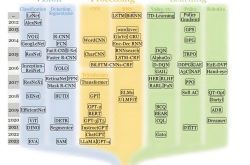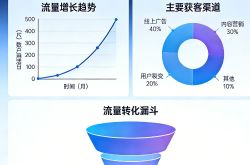After enduring for three years, Lei Jun finally unleashed his passion
![]() 07/22 2024
07/22 2024
![]() 693
693

Dressed in a casual suit with a white T-shirt, Lei Jun, the founder of Xiaomi, took the stage in a classic "Lei Jun style" outfit. On the evening of July 19th, he began his fifth annual speech.
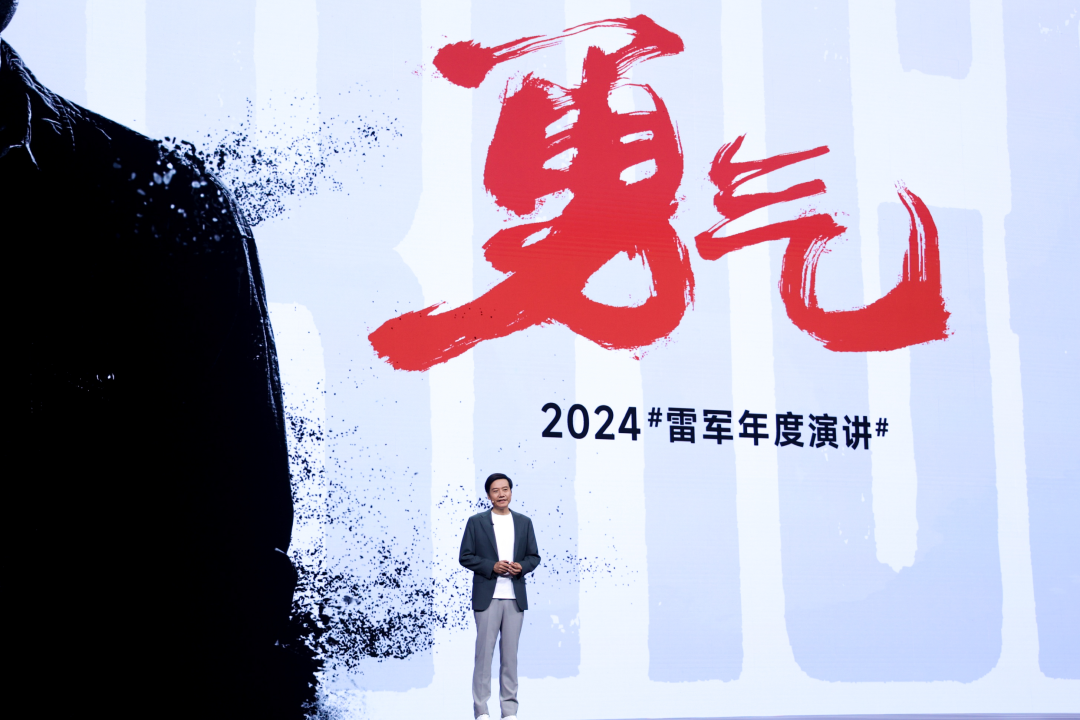
The previous four speeches were around August 11th each year, but this time it was more than 20 days earlier. Part of the reason might be that after three years of preparation, Lei Jun couldn't wait to share the story behind Xiaomi's entry into the automotive industry.
Since announcing Xiaomi's foray into the automotive industry at the end of March 2021, Lei Jun has rarely disclosed details about it. Even amidst widespread curiosity and skepticism, Lei Jun led his team to quietly make progress.
Finally, the overwhelming success of Xiaomi SU7, which was released in March this year, allowed Lei Jun to feel truly vindicated after "three years of hard work."
Therefore, it is not surprising that Lei Jun chose "courage" as the theme of his speech, focusing on the "story of carmaking."
In his 1-hour and 15-minute speech, Lei Jun recounted how Xiaomi decided to venture into the automotive industry amidst unexpected crises, faced doubts and challenges, and after three years of ups and downs, finally achieved a successful debut in the automotive world.
Continuing the pattern of storytelling in the first half and unveiling new products in the second half, Lei Jun introduced a series of new products, including a large folding phone, Xiaomi's first small folding phone, headphones, watches, and other ecosystem products.
Since Lei Jun began his annual speeches on the occasion of Xiaomi's 10th anniversary in 2020, the themes of each speech have been closely related to Xiaomi's situation at the time. In the previous four speeches, Lei Jun almost always looked back on the past, including his personal growth journey, entrepreneurial history, trough periods, etc., and often mentioned the company's strategies.
This time, Lei Jun's annual speech focused entirely on the story of carmaking, reflecting his joy at winning a significant battle.
01 Focusing on Carmaking: Three Years of Ups and Downs, Finally Sitting at the Table
At the beginning of his speech, Lei Jun went straight to the point, recounting the origins of Xiaomi's decision to enter the automotive industry amidst unexpected crises.
On January 15, 2021, an unexpected crisis prompted Xiaomi to seriously consider carmaking. "Mr. Lei, you've been sanctioned by the US." This news was like a bolt from the blue for Lei Jun. "What will happen to the company's 30,000-40,000 employees if we can't make phones anymore?" Carmaking was thus put on the agenda.
After thorough research, Xiaomi realized that carmaking would require a significant investment of at least $10 billion. The board's final requirement was, "You can make cars, but Lei Jun must personally lead the effort."
Lei Jun said that Xiaomi was going through a tumultuous period at the time, transitioning from a guerrilla force to a regular army, with its premiumization strategy just getting started, and with the departure of core executive Shouzi Zhou.
At the age of knowing one's destiny, Lei Jun struggled for a week: "Is it worth starting all over again after such a hard entrepreneurial journey? What if I fail? Will I have to end my career in disgrace? At this age, do I still have enough strength and energy to enter a brand-new industry?"
Lei Jun firmly believed that "the trend of smart electric vehicles is unstoppable, and I will forge ahead despite all obstacles."
After deciding to make cars, Xiaomi faced two major doubts: First, was it too late? Some new automotive forces had been established six or seven years ago. Second, why not raise funds independently and go public? Xiaomi had received olive branch from capital investors, valuing the company at billions of dollars without anything tangible.
However, Xiaomi believed that the automotive industry is a century-old race, and it's not too late to enter. The carmaking cycle is long, and by funding the venture itself, Xiaomi would have greater patience with the business.
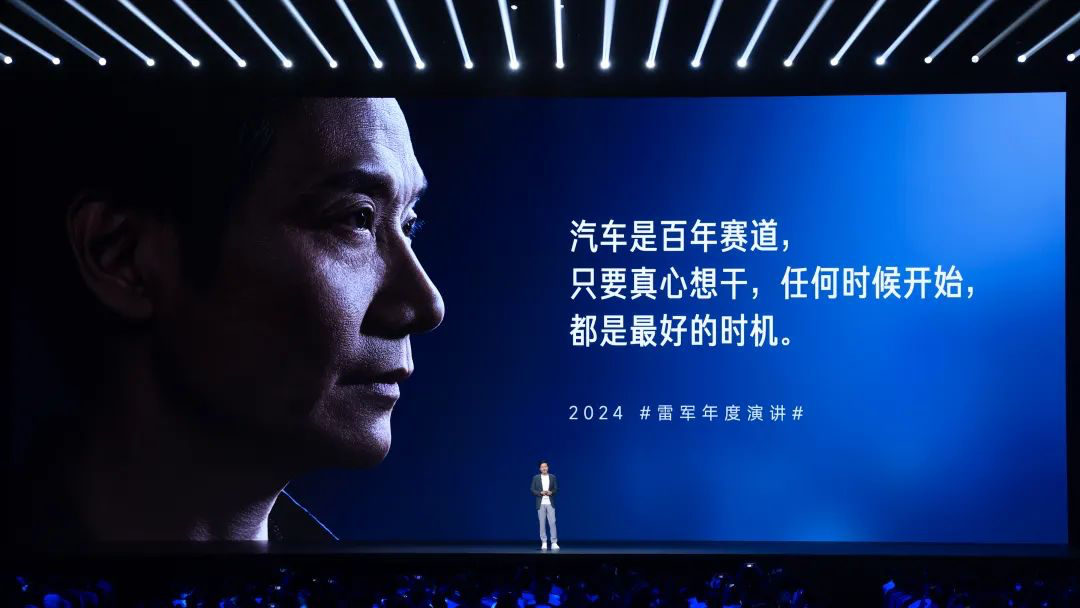
Afterward, Xiaomi focused on core technologies instead of outsourcing production, investing heavily in various core areas such as motors, large die-casting clusters, intelligent driving, and battery packs. At the height of project tension, Xiaomi even paused to hold a 21-day management meeting, deciding to "first do things right before seeking extraordinary results."
This led to Xiaomi's first car rolling off the production line. Lei Jun was anxious during new car testing, media test drives, and setting production capacity and pricing. The most difficult part was pricing, with outsiders even joking about selling a car for "99,000 yuan." In the end, Lei Jun withstood internal and external pressures and set the price at 215,900 yuan.
At the Xiaomi SU7 launch event on March 28, 2024, pre-orders exceeded 10,000 within just 4 minutes and 50,000 within 27 minutes. Within 24 hours, pre-orders reached 89,800. By June 2, 2024, Xiaomi reported that cumulative deliveries of SU7 had reached 15,800 units.
To meet delivery deadlines, Xiaomi's factory started double-shift production. For the entire year of 2024, Xiaomi aims to deliver at least 100,000 units and strive for 120,000 units. Compared to some more established new energy vehicle manufacturers that have set annual delivery targets of only 100,000 units, Xiaomi's progress is remarkable.
The domestic new energy vehicle industry has entered a brutal elimination round, and Xiaomi missed the first wave. However, the success of Xiaomi SU7 fully demonstrates that Xiaomi Automobile has taken the first step from 0 to 1 and sat at the table.
Next month, Xiaomi will release its first financial report disclosing automotive performance, ushering in a new valuation reassessment.
02 Unveiling New Models: Crossing Cycles and Opening New Horizons
This tech spring festival-like event, of course, couldn't do without Xiaomi phones.
After discussing carmaking, Lei Jun quickly unveiled a series of new products, including the folding flagship phone Xiaomi MIX Fold 4, Xiaomi's first small folding phone Xiaomi MIX Flip, the "performance monster" Redmi K70 Ultimate Edition, and a host of smart ecosystem technology products such as headphones.
Each product represents a breakthrough. For example, the small folding phone was planned for years before its release, equipped with a full-size multi-functional outer screen, the third-generation Qualcomm Snapdragon 8 mobile platform, a Leica Summilux large aperture lens, a built-in 4780mAh Xiaomi Jinshajiang battery, and full-screen photography capabilities.

Xiaomi's new large folding phone has made significant progress in thinness and lightness, weighing only 226g with a folded thickness of 9.47mm and an unfolded thickness of just 4.59mm, slightly thicker than a SIM card slot.
However, more noteworthy than the products themselves might be Xiaomi's progress in its premium strategy.
In the first half of 2021, Xiaomi's phone sales briefly surpassed Apple, ranking second globally. However, the following year, the consumer electronics industry experienced a rare downturn. In 2021, Lei Jun was in the limelight during his annual speech, but the following year, his speech focused on life's troughs.
Against this backdrop, premiumization became particularly important. In the second half of the increasingly competitive mobile phone industry, fierce competition in the low- and mid-end markets has left little profit. Only by expanding market share in the premium segment can brands strengthen their position and improve profitability. Last year, Lei Jun even declared, "Premiumization is the only way for Xiaomi's development and a battle for survival."
Xiaomi's phone business began its push into the premium market with the Xiaomi 10 series, but subsequent models like the Xiaomi 11 and Xiaomi 12 series encountered significant challenges in product quality, leading to significant losses for the company.
However, Xiaomi did not give up. With a steady and aggressive strategy, the Xiaomi 14 series sold over 1 million units in its first sale, firmly establishing itself in the premium market.
Moreover, Xiaomi's overall phone business has recovered ahead of the industry. Third-party research institutions estimate that the overall mobile phone market will grow by 1% to 2% in 2024, but Xiaomi's President Lu Weibing mentioned that Xiaomi's growth target is significantly higher than the industry average.
From a financial perspective, Xiaomi experienced a decline in both revenue and net profit throughout 2022, but since Q3 2023, it has basically recovered growth in both revenue and net profit.
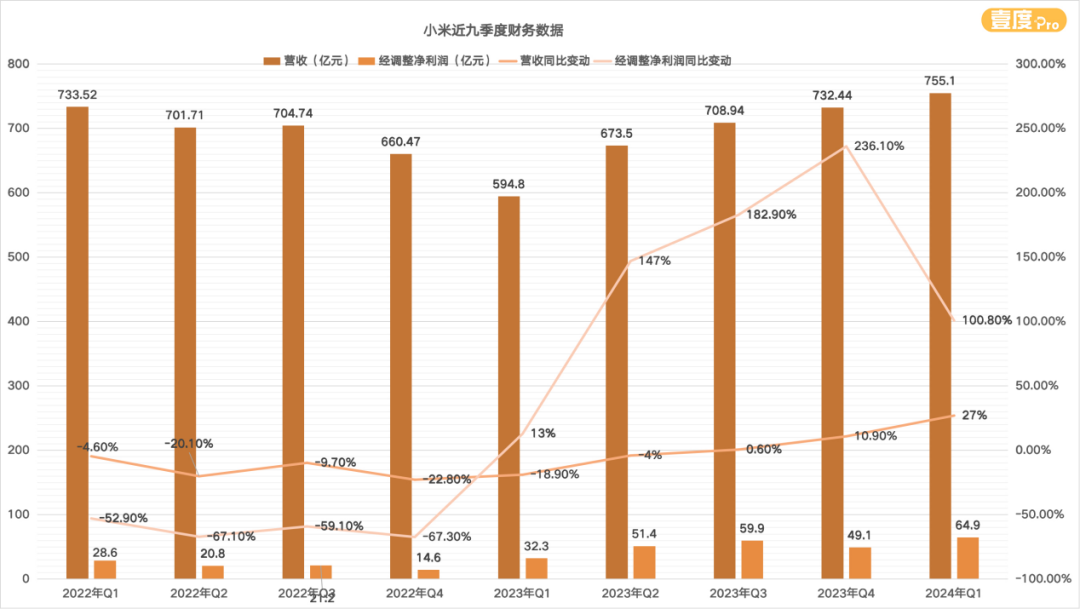
Made by Yidu Pro / Xiaomi's financial data for the past nine quarters
In Q1 2024, Xiaomi made a strong start, achieving revenue of 75.5 billion yuan, a year-on-year increase of 27%; adjusted net profit of 6.5 billion yuan, a year-on-year increase of 100.8%, setting a new quarterly record. Xiaomi's core phone business shipments even increased by more than 30% year-on-year, pulling the company out of the doldrums.
Over the five years of Lei Jun's five annual speeches, Xiaomi's phone business has experienced a cycle of soaring to new heights, falling into a trough, and slowly climbing back up. Today, Xiaomi's phone business has crossed the cycle and opened up new horizons.
03 Not the Protagonist of a Thrilling Novel, But a Difficult Breakthrough
Some people have described Lei Jun's experience as that of the protagonist of a thrilling novel: "attending a prestigious university, earning his first pot of gold in college, becoming general manager of Kingsoft soon after graduation, achieving financial freedom at a young age, and building Xiaomi into a Fortune 500 company."
However, shortly before the speech, Lei Jun personally debunked these rumors, saying that he was not the protagonist of a thrilling novel. On the contrary, Lei Jun's journey has been one of difficult breakthroughs.
Lei Jun's diligence and pragmatism are evident to all. While many internet tycoons have retreated behind the scenes, Lei Jun remains active in the front lines of business, leading the way in new ventures. Moreover, his ability to consistently deliver annual speeches for five years is almost unprecedented among internet tycoons.
When venturing into carmaking, Lei Jun did a lot of homework himself to deepen his understanding of the business. To test drive enough cars, he began driving personally and even borrowed cars by leaving notes on the company's parking lot. Over three years, he test-drove more than 170 cars and took over 200,000 words of notes. Lei Jun is also one of the few car company bosses to participate in winter and summer tests of new cars.
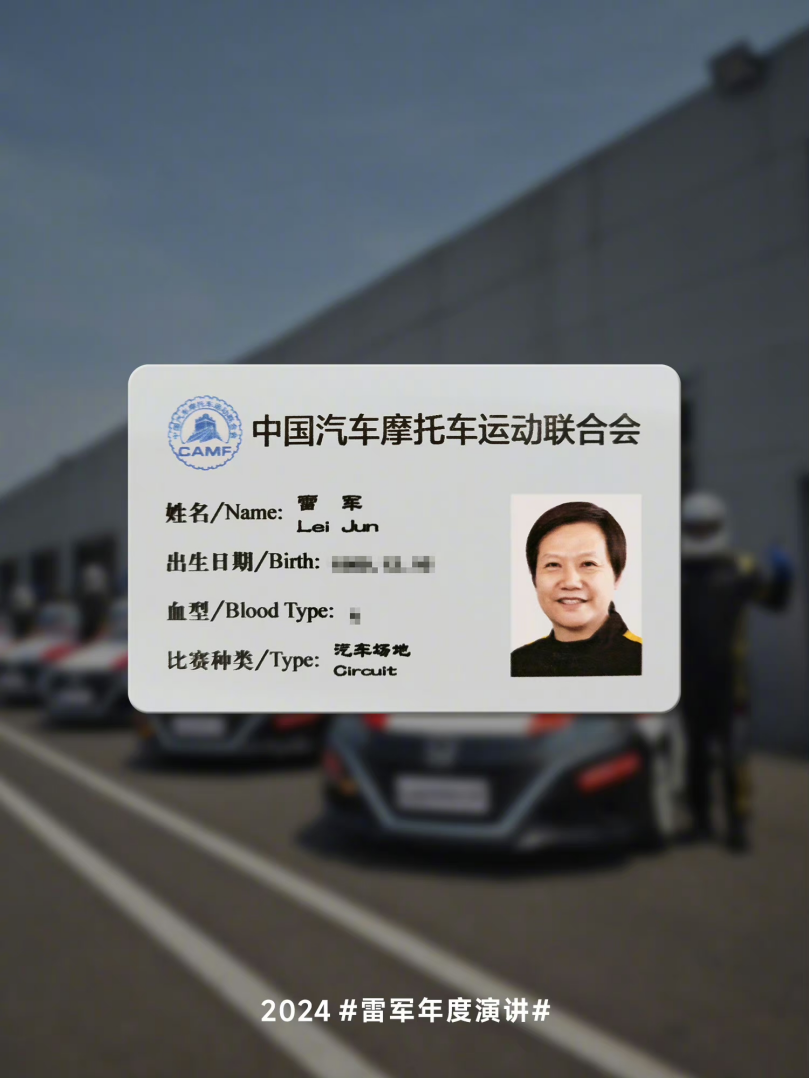
To become one of the best domestic car company bosses behind the wheel, Lei Jun even learned to drive race cars and obtained a racing license. For road tests, he once drove from Beijing to Shanghai, covering 1,276 kilometers in 15 hours.
Perhaps it is precisely this diligence and pragmatism that allows Lei Jun to gain the support of countless Mi Fans with his strong personal charm. This led to Professor Shen Li from Sichuan University buying a parking space shortly after Xiaomi announced its entry into carmaking, waiting for the release of Xiaomi's first new car.
After Lei Jun unveiled Xiaomi's new car this year, it sparked a trend among auto industry leaders to become internet celebrities. Lei Jun, who was mobbed at auto shows, was even joked about: "In the past, we went to auto shows to see car models; now, we go to see CEOs."
However, Lei Jun is difficult to imitate. Many tycoons have tried their hand at selling cars, and many bosses want to be internet celebrities or IPs like Lei Jun, but only Lei Jun firmly holds the position of the "God of Traffic."
During the three years of carmaking, Lei Jun faced widespread ridicule and doubts. This annual speech was Lei Jun's way of giving those doubters a resounding slap in the face.
At the end of the conference, Lei Jun also announced Xiaomi Automobile's new goal: to become one of the top five automakers globally within 15-20 years, to take on the challenging Nürburgring Nordschleife racetrack, and to become the fastest four-door electric car on the Nürburgring within ten years.
Xiaomi's new long march has just begun, but regardless, Lei Jun, full of courage and committed to carmaking, has led Xiaomi to see new hope.
As Xiaomi's pillar business of mobile phones fully recovers and its second curve of carmaking wins its first battle, both Xiaomi and Lei Jun stand at a new historical turning point.
Images are from the conference, please remove if infringement occurs.



